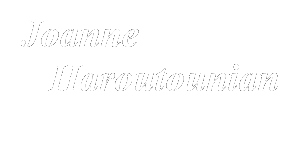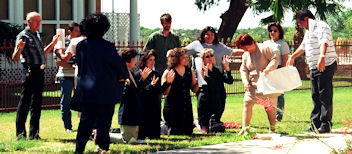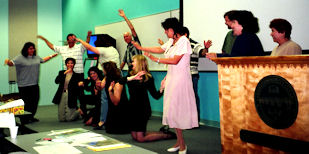





|
|||||||
|
|
|
The following workshops can be modified or expanded in length to suit multiple day seminars or one-credit courses at colleges and universities or gifted accreditation sessions in teacher development in gifted education. Contact Dr. Haroutounian for discussion of fees for workshops, seminars, training, and consulting work. Kindling the Spark: Recognizing and Developing Musical TalentThis session presents specific criteria and procedures for musical talent identification and an overview of effective long-range talent development. Presentation includes a structural outline, specific rating forms, and “sparkler” classroom activities that highlight potential talent in a general or music classroom. Talent development overview includes promising programs, specialized school curricula, and guidelines for implementing programs that embrace community music resources. The workshop expands on ideas found in the text, Kindling the Spark: Recognizing and Developing Musical Talent (2 hours) How Mozart REALLY Makes You SmarterWord is out - listening to Mozart will make you smarter! Learn the facts about the Mozart Effect and how perceptive listening and interpretive decision-making while listening and creating music provides the REAL learning through music. Participants will learn simple listening and performance activities that will enrich any classroom through musical learning. (1 hour) The Performance Portfolio: Insight into Student Perception, Critique and Self-AssessmentThe Performance Portfolio process allows students to observe, listen and evaluate their own artistic performance on video or audio recordings. By completing critique forms with specific performance criteria and verbal general critiques, students guide their own improvement and refinement in their art form. This session presents specific student examples and may include live student performance and a group critique experience. (1- 1 ˝ hours) MusicLink: Collaborative Efforts to Foster Musical TalentThis session describes programs of the MusicLink Foundation, a non-profit organization dedicated to nurturing promising students through long-term instruction and independent study options. The program offers partial to full scholarship music lessons to students with potential talent and in financial need, identified by schools or community youth organizations. The StudyLink program awards academic credit to musically talented high school music students through a variety of independent study options. The MusicLink program extends across the country and into Canada, reaching close to 5,000 students with teachers providing in-kind instruction equivalent to $7.6 million. (1 hour) Teaching the Artist Within EVERY Student: Artistic Ways of KnowingEvery student in your classroom can learn to think like an artist through Artistic Ways of Knowing. The artistic learning process requires students to manipulate ideas through unique cognitive/perceptual ways of knowing. This workshop/seminar presents the artistic thinking skills of perceptual discrimination, metaperception, problem finding/solving, creative interpretation, the dynamic of performance, and critiquing. Participants will enjoy “sparkler” activities that highlight these skills, and receive guidelines in how to incorporate artistic thinking in academic content areas. (1 ˝ hours) Think Like an Artist: Lessons that Experience the Artistic Creative ProcessThis session allows participants to experience actual lessons that bring artistic thinking and perceiving to life that can be directly used in classrooms. The lessons include all four arts domains – music, theater/drama, movement/dance, and visual arts as well as lessons across domains. Each lessons is based on artistic ways of knowing and helps identify students who show potential talent in the arts.
Arts Talent IdentificationThis session describes ArtsTalent ID, an effective procedure for identifying talent in the arts based on criteria stemming from research analysis. Participants examine rating scales, a mini-curriculum of arts activities, and performance/portfolio assessment forms that broadens the concept of artistic talent beyond performance and product. The identification curriculum included in the process is based on “artistic ways of knowing,” which incorporates perceptual discrimination, creative interpretation, performance, and critiquing skills. The curriculum can easily be integrated into the classroom to assist in arts talent identification as well as to provide substantive content that encourages all students to perceive, think, and create as artists. (From 2 hour overview to multiple day training) Performance Assessment in the Arts - Beyond the AuditionThe normal application procedure for any specialized program in the performing arts includes some type of audition or portfolio process. Often, these auditions are intimidating experiences that favor well-trained performers, with minimal observation of a student’s ability to create or interpret while working through the arts. This session describes how artistic problem-solving can be intertwined in the audition process, and used as an ongoing core in an arts-based gifted program. Participants will engage in an artistic problem-solving experience and view student examples from the University of Virginia’s Summer Enrichment Program in the Arts (SEPIA). (1 ˝ hours) Artistic Challenges in the Academic Classroom – From STEM to STEAMTeachers are embracing the STEM curricular challenges in their classrooms with some integrating the arts inti the mix to create STEAM. Are these arts activities effectively developing artistic ways of knowing? Are they providing challenging experiences for students who show talent in visual and performing arts? This session describes a simple way to expand the curriculum in breadth, depth, pacing, and creativity while instilling artistic learning for all levels of talent in the STEM classroom. Guidelines and activities incorporating differentiation for artistically talented students will be provided. (1 ˝ to 2 hours) Differentiated Curriculum in the ArtsYou have finally succeeded in identifying students who show talent in the visual and performing arts. Now what do you do? This session gives guidelines in developing differentiated curricula and programs specifically suited for artistically talented students. The session presents ideas that extend opportunities beyond the school walls and provide flexibility that provides real-world arts experiences for students seeking professional level artistic training. (1 to 1 ˝ hours) |
| YouTube | Podcast | Tips | Shopping | Contact |